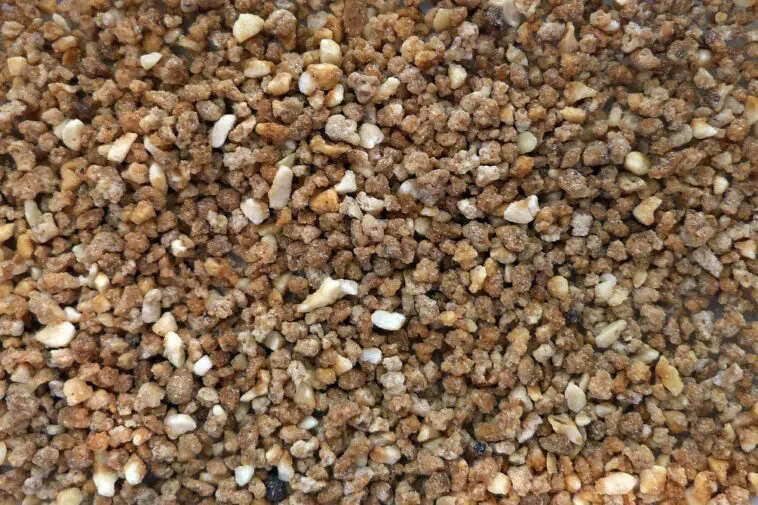Vermiculite is a rectangular, ultra-light particle formed by superheating a hard mineral. By superheating this mineral, it expands and forms air pockets, similar to heating corn kernels to make popcorn. Vermiculite has an incredible capacity to hold a lot of moisture, which may help you create the ideal growing environment for your moisture-loving houseplants.
Previously, we discussed Leca as a soil-free growth medium for plants that prefer to dry out every now and then. Vermiculite, on the other hand, is ideal for plants that require a lot of moisture. Additionally, vermiculite is ideal for your next propagation endeavor.
We’ll look at the following subjects in this guide:
- What exactly is vermiculite?
- Vermiculite pros/cons
- How can you use Vermiculite to grow houseplants?
Let’s go right in, since I’m thrilled to introduce you to this incredible growth medium!
Read more: Smart Gravel for houseplants?
Table of Contents
What exactly is vermiculite?
The fact that vermiculite is a mineral that has been heated to extremely high temperatures was revealed in the introduction. During this process, the material goes from being a dense rock to being transformed into relatively lightweight blocks that resemble wood chips. These blocks are available in a range of sizes, from a few millimeters up to around 1.5 centimeters (0.5 inch).
When it comes to growing houseplants, the size of these pots has a significant impact in how well they work. When it comes to growing houseplants, the bigger particles are ideal for utilizing on their own, while the smaller particles are ideal for combining with soil in various proportions.
Because fruit trees and vegetable plants thrive in consistently wet soil, most people choose to use vermiculite in their vegetable and fruit gardens. Because it is sterile, vermiculite will not alter the pH level of the soil in which it is applied.
This is essential information to have, as it indicates that you may incorporate it into your soil without the need to also use pH neutralizers. Convenient! It’s fantastic for fruits and veggies, but it also works well with houseplants.
Read more: The five simplest houseplants for beginners
Vermiculite pros/cons
Vermiculite is an excellent long-term solution for growing moist-loving plants. But, if there are benefits, there must also be drawbacks to utilizing Vermiculite. Let’s go through the advantages and disadvantages so you can determine if Vermiculite is something you want to try.
Vermiculite’s Advantages
Vermiculite is superior to soil in its ability to hold onto moisture. In addition to being good at holding onto water, it is also good at holding onto nutrients, and it is typically pretty good at maintaining its form. This allows oxygen to more easily move through the soil’s particles, which ultimately helps to aerate the ground.
The combination of these three qualities makes it an ideal location for producing moisture-loving plants, such as fruits and vegetables.
Propagation
Vermiculite can be utilized either by itself or combined with other types of soil. When it comes to the process of propagating your plants, this is the ideal growth medium to use. It’s similar to growing plants in water, but with added oxygen flow.
When you are solely using water for the propagation process, very little oxygen will get to the plant’s roots. Because vermiculite is composed of solid particles, oxygen may readily move between the different components to reach the plant’s roots.
Read more: Does the direction of the sun affect your houseplant?
Light soil
When you combine Vermiculite with your soil, you are essentially introducing extremely lightweight pockets of air to your soil. Vermiculite is often used as a soil amendment. Your plant will have an easier time developing roots if the soil is light and capable of effectively keeping moisture. When soil is saturated with water, it tends to become rather dense and difficult to work with. Your plant will have a harder time growing roots in this thick soil, which will slow down its overall growth.
The lighter soil encourages growth and makes it possible for the roots to swiftly spread over the whole container. The presence of vermiculite, on the other hand, assists to enhance oxygen flow to the roots, whereas heavier soil prevents more oxygen from reaching them.
Fertilizing
Vermiculite, in contrast to the vast majority of conventional hydroponic growth medium, is exceptionally good at soaking up nutrients. Your plants will have a much easier time absorbing nutrients if you use vermiculite, which is fantastic for encouraging a great deal of rapid growth. It should be clear to you now why farmers of fruits and vegetables want to make frequent use of this growth medium.
Long-term remedy
Vermiculite is a sterile growth medium that does not include any biological organisms. One of the most significant advantages of this is that vermiculite does not expire. It has a built-in defense mechanism against fungus, mold, and other ailments. Your plants that require a lot of moisture will benefit tremendously from having this component of the soil. Fungi thrive in environments with this kind of dampness because it provides the ideal conditions for their development. This may be avoided with the aid of vermiculite.
Read more: Do different kinds of soil make a difference for the health of your plant?
Vermiculite’s disadvantages
Vermiculite is wonderful, but there is one significant drawback to using it. When working with vermiculite, it is essential to conduct experiments in order to determine the ideal ratio of vermiculite to soil for your particular situation. It is very simple to overwater your plants if you use an excessive amount of vermiculite in the soil.
Vermiculite’s water-retention properties, which are its greatest advantage, can swiftly become its disadvantage. It retains moisture for an extended period of time and does not drain efficiently on its own. This might result in root rot.
Because it’s easy to overwater your plant with it, I’ll provide a soil mix that improves drainage and turns this growth medium into your best buddy.
How can you use Vermiculite to grow houseplants?
So, despite seeing the largest drawback, you’ve decided to keep reading because you still think Vermiculite is worth a shot? Great! In this part, I’ll share with you the proportions of soil mix that I’ve used for my Calathea Ornata, a plant that is finicky about its growing conditions and adores wetness. This soil mixture, which also assists the plant in thriving without requiring excessive attention, brought it back from the brink of death.
This makes me really excited to tell you about this soil mixture, because if it worked for me, it might work for you too.
Read more: Bottom Vs Top Watering: Which Is Better For Your Plant?
The Vermiculite soil combination
The following is an excellent combination of vermiculite and soil, as was previously addressed in the section titled “How to make your soil hold more water.”
- 1/6 Vermiculite
- 2/6 leca/perlite/sand
- 3/6 (half) soil
This blend not only ensures that the soil does not retain an excessive amount of water, but it also provides excellent moisture retention. The use of this soil mix helps to deliver a healthy dose of oxygen to the plant’s roots, gives the plant the ideal amount of hydration, and enables the soil to drain away excess water effectively.
This soil combination has a lot of potential, and I really hope that it will help you take better care of the plants in your garden that require a lot of moisture.
Conclusion
Vermiculite is a growth medium that can be used in hydroponics and is also extremely simple to combine with soil in order to support your plants that flourish in damp environments. Vermiculite is inherently resistant to fungal and mold growth as well as other diseases, and it has the ability to absorb nutrients that your plant needs to thrive.
The one and only drawback I’ve encountered with it is that it requires a great deal of trial and error on the part of the user in order to determine the appropriate ratio of it to the soil. Vermiculite is an extremely adaptable growth medium, and it has already demonstrated its value to me by preventing the death of my Calathea Ornata plant.
I appreciate you taking the time to read my article. I really hope that this information is of use to you in maintaining the health and beauty of your plants.
Read more: Can you water your houseplants with tap water?
Frequently Asked Questions
Can you use vermiculite to grow houseplants?
You may use vermiculite not just in your garden but also for indoor plants because it is beneficial to plants that thrive in damp environments. The vermiculite will be able to retain a great deal more moisture than your soil will be able to, which will facilitate the growth of plants that are very fond of wetness.
Why is vermiculite good for propagating houseplants?
Vermiculite is ideal for propagating houseplants because it provides a more favorable growth environment than water. When you use vermiculite, oxygen may still reach the roots of your cutting. In addition, it provides ample moisture so that the cuttings may develop roots more quickly.
Why is vermiculite good for your houseplants?
Because it is able to retain water for a considerably longer period of time than soil does, it is an excellent medium for growing moisture-loving houseplants. Additionally, it inhibits the growth of fungus and makes it simpler for your plant to take up nutrients.
Read more: Can you take a houseplant outside?
Photo by form PxHere



